Posts Tagged ‘Parliament’ (44 found)
Move to Proportional Representation a Power Grab by the Military-backed USDP
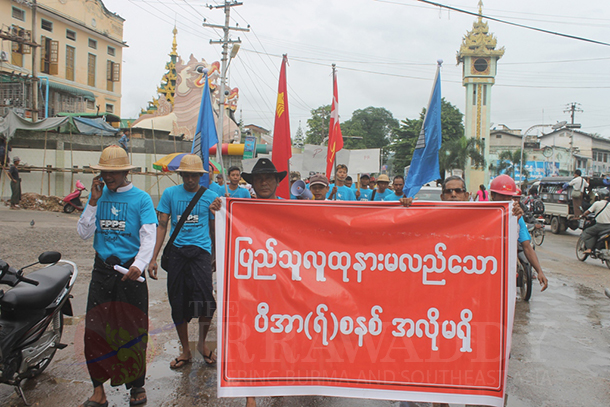 The debate over a potential change to Burma’s electoral system, from a First Past the Post System (FPP) to a Proportional Representation System (PR) is gathering momentum, with a new committee formed by the Parliamentary lower house speaker, Shwe Mann, to discuss whether this is appropriate for the country. While the general debate over suitability of differing electoral systems is complex and broad, if seen through the eyes of the context in Burma, there is one clear winner if this change is implemented before the 2015 general election: the military-backed Union Solidarity and Development Party (USDP) which is unsurprisingly supportive of this change.
The debate over a potential change to Burma’s electoral system, from a First Past the Post System (FPP) to a Proportional Representation System (PR) is gathering momentum, with a new committee formed by the Parliamentary lower house speaker, Shwe Mann, to discuss whether this is appropriate for the country. While the general debate over suitability of differing electoral systems is complex and broad, if seen through the eyes of the context in Burma, there is one clear winner if this change is implemented before the 2015 general election: the military-backed Union Solidarity and Development Party (USDP) which is unsurprisingly supportive of this change.
The argument for Burma to change to PR is certainly compelling. Theoretically, it will give smaller political parties, such as the NDF who proposed the motion, more chance of representation in the legislature, while the same goes for smaller ethnic political parties. Yet it is much more complex than this. For constituencies in ethnically concentrated areas, where there is a dominant ethnic political party, for example the Rakhine Nationalities Development Party (RNDP) in Arakan State, FPP is more advantageous for that dominant ethnic political party, as seen in the RNDP’s dominance of the Arakan State legislature. Focusing on winning seats in ethnically concentrated areas might be the only way that ethnic political parties guarantee representation under the first past the post system. Yet under PR, if the total population of a certain ethnic group is under the 1% threshold of votes needed to gain a seat that is typical of PR, then that party will not win any seats at all, even if the ethnic nationality it represents is dominant in certain constituencies.[…]
• • •Burma: Four Reporters Sentenced to Lengthy Prison Terms
Paris, Bangkok: The conviction of four reporters to lengthy prison terms is the clearest sign of Burma’s backsliding on press freedom, FIDH and its member organization, the Alternative ASEAN Network on Burma (ALTSEAN-Burma), said today. On 10 July, a court in Pakokku, Magwe Division, sentenced all four Unity Weekly reporters Lu Maw Naing, Yarzar Oo, Paing Thet Kyaw, and Sithu Soe and the Unity Weekly CEO Tint San to 10 years in prison with hard labor under the 1923 Official Secrets Act […]
• • •Burma’s Top Priority Must Be Constitutional Reform for All
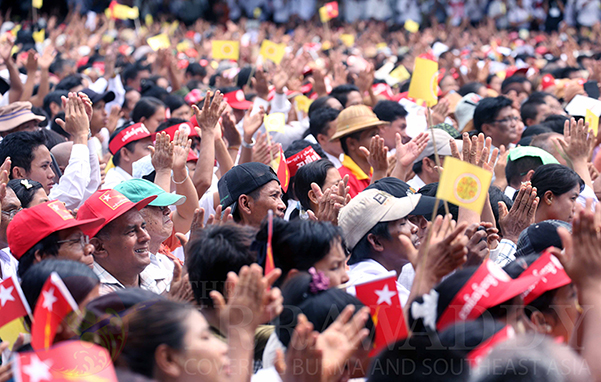 The NLD and 88 Generation Peace and Open Society have been campaigning actively and vociferously for various amendments to the military-drafted 2008 Constitution. Over the weekend, thousands of supporters came out in support of mass rallies for constitutional reform held in Rangoon and Mandalay on Saturday and Sunday, respectively. It is the first time that the two pro-democracy parties have co-hosted an event […]
The NLD and 88 Generation Peace and Open Society have been campaigning actively and vociferously for various amendments to the military-drafted 2008 Constitution. Over the weekend, thousands of supporters came out in support of mass rallies for constitutional reform held in Rangoon and Mandalay on Saturday and Sunday, respectively. It is the first time that the two pro-democracy parties have co-hosted an event […]
Not a Rubber Stamp: Myanmar’s Legislature in a Time of Transition
Myanmar’s new legislature, the Union Assembly formed in 2011 on the basis of elections the previous year, has turned out to be far more vibrant and influential than expected. Both its lower and upper houses have a key role in driving the transition process through the enactment and amendment of legislation needed to reform the outdated legal code and are acting as a real check on the power of the executive.
Yet, some bills moving through the legislature have raised concerns that the authorities, both legislative and executive, may not be ready to give up authoritarian controls on the media, on civil society organisations and on the right to demonstrate. More broadly, the role of the 25 per cent military bloc and its impact on the legislature have been questioned. Serious individual and institutional capacity constraints and unclear procedures serve as a brake on effective, efficient lawmaking […]
• • •Not a Rubber Stamp: Myanmar’s Legislature in a Time of Transition
In its latest briefing, Not a Rubber Stamp: Myanmar’s Legislature in a Time of Transition, the International Crisis Group looks at Myanmar’s Union Assembly, formed in 2011 and the first independent such body the country has seen in half a century. Both its lower and upper houses have shown some strengths and are important drivers of the transition process. However, they sometimes struggle to develop technically sound and democratically oriented laws […]
• • •Significant Constitutional Changes are a Must for Genuine Democracy
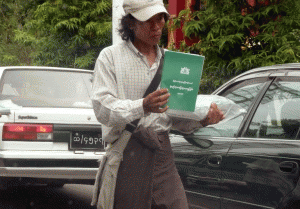 As the timeframe for submission to the parliamentary Joint Committee for Reviewing the Constitution enters its final month, pressure to amend this flawed document is ratcheting up. Opposition parties, ethnic armed groups, democracy activists, members of the public and Daw Aung San Suu Kyi are all voicing how imperative it is for democracy that the constitution is changed.
As the timeframe for submission to the parliamentary Joint Committee for Reviewing the Constitution enters its final month, pressure to amend this flawed document is ratcheting up. Opposition parties, ethnic armed groups, democracy activists, members of the public and Daw Aung San Suu Kyi are all voicing how imperative it is for democracy that the constitution is changed.
The 2008 Constitution, which the military regime introduced after a sham referendum in 2008, entrenches the Burma Army in positions of power, gives the state the ownership of all land in the country, and denies Burma’s ethnic nationalities equality and the right to self-determination. It also fails on grounds of inclusiveness, omitting to protect and respect the human rights of all people in Burma, regardless of race, religion or color. It is undemocratic, illegitimate and a major hurdle for progress in Burma’s reform process […]
Burma’s Draft Association Law: A Smokescreen for Further Repression?
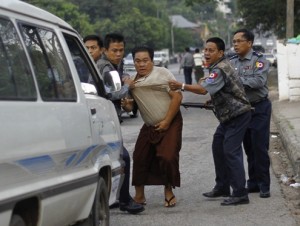 One of the main hopes for Burma’s recent political reforms has been for a vibrant, open and flourishing civil society – a vital component of any healthy democracy and an enabling environment for sustainable development. For Burma’s people to feel invested in its country’s political, economic and social development, they must be allowed to participate and they must be empowered. Yet participation and empowerment cannot happen if there are onerous or arbitrary restrictions on the right to freedom of association.
One of the main hopes for Burma’s recent political reforms has been for a vibrant, open and flourishing civil society – a vital component of any healthy democracy and an enabling environment for sustainable development. For Burma’s people to feel invested in its country’s political, economic and social development, they must be allowed to participate and they must be empowered. Yet participation and empowerment cannot happen if there are onerous or arbitrary restrictions on the right to freedom of association.
It was therefore disheartening to see the draft Association Law, published by the Public Affairs Management Committee on 27 July in a state-run newspaper. The draft law violated constitutional and international standards of free association, with international law permitting only limited and narrowly defined exceptions. It also flouted accepted international standards for laws on associations or not-for-profit organisations. The draft law made registration compulsory rather than voluntary, with unregistered associations prohibited from operating and facing disproportionate and draconian penalties of up to three years in prison as well as hefty fines for establishing or even participating in an unregistered association. In fact, the law would have needed to have been almost entirely redrafted to comply with international standards […]
Update on Progress of Response by Myanmar Civil Society Organizations on Draft Association Law
On 27 July 2013, draft Association Law prepared by Public Affair Management Committee (PAMC) of the People Assembly was published with a notice for the public to study and comment before it is submitted to the parliament for discussion. On 31 July, Civil Society Organizations (CSOs) from Yangon and Mandalay held workshops in their own […]
• • •BURMA: Speaker of Legislature Puts State Sovereignty Ahead of Torture Elimination
On 21 March 2013 a member of the national legislature in Burma introduced a motion calling for the country to join the United Nations Convention against Torture. In his motion, Dr Aung Moe Nyo, member of the National League for Democracy for Pwintbyu, Magway Region, argued that as the country is now developing and democratising in accordance with international standards it would be appropriate to join the convention […]
• • •Rampant Land Confiscation Requires Further Attention and Action from Parliamentary Committee
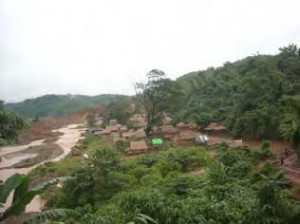 This past week the parliamentary Farmland Investigation Commission submitted its report on land confiscation to the parliament. The report finds that the military have taken almost 250,000 acres of land from villagers. The commission stated that they had spoken to military leaders about the confiscation, “Vice Senior-General Min Aung Hlaing […] confirmed to me that the army will return seized farmlands that are away from its bases, and they are also thinking about providing farmers with compensation.”
This past week the parliamentary Farmland Investigation Commission submitted its report on land confiscation to the parliament. The report finds that the military have taken almost 250,000 acres of land from villagers. The commission stated that they had spoken to military leaders about the confiscation, “Vice Senior-General Min Aung Hlaing […] confirmed to me that the army will return seized farmlands that are away from its bases, and they are also thinking about providing farmers with compensation.”
The investigation is a step in the right direction but there still exist very large problems the commission has not addressed, the first being that the commission only addressed land confiscated by the military. Although the military has been involved in land confiscations they are not the only perpetrators.
An example of the shortcomings of the commission’s report is the fact that the Letpadaung copper mine is not mentioned by the commission because the land was not confiscated outright by the military, although it is a joint venture with the military owned Union of Myanmar Economic Holdings Ltd (UMEH). Additionally the Letpadaung Inquiry Commission headed by Aung San Suu Kyi charged with investigating the abuses that took place has delayed releasing its findings for a third straight time […]









 All posts
All posts